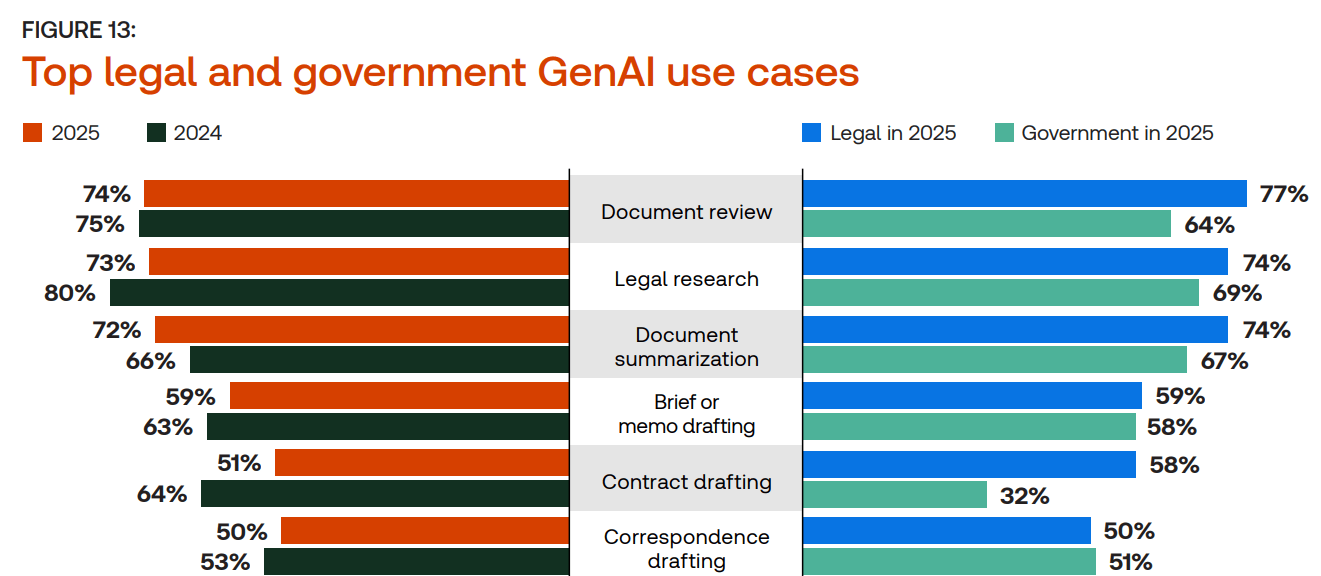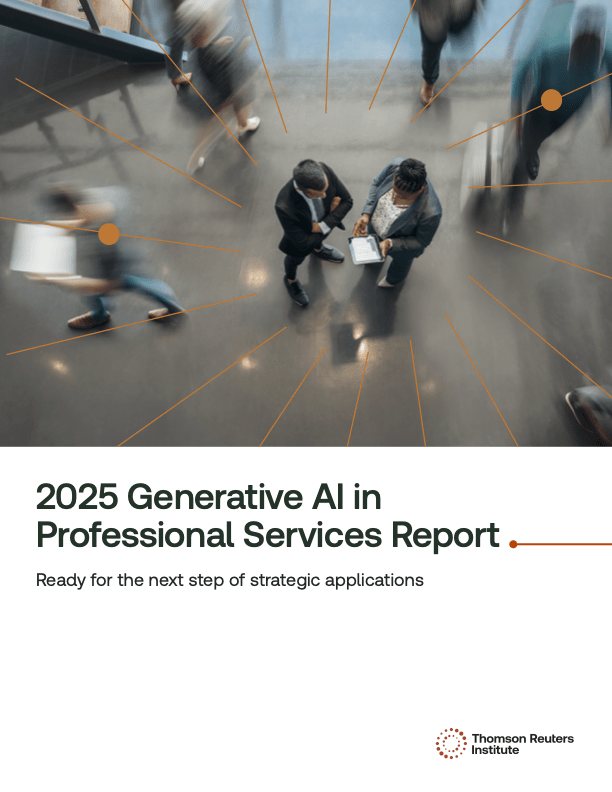Explore the growing potential of generative AI and how it can be applied to legal work
Imagine a world where your time is focused on work that fully engages your intellect and professional expertise. Such a world is coming into view, thanks to generative artificial intelligence (GenAI).
The growing excitement about GenAI among professionals is one of the key findings in the Thomson Reuters Institute’s recently released 2025 Generative AI in Professional Services Report. More than half (55%) of the professionals surveyed in the report describe their view regarding the use of generative AI as excited or hopeful. What’s more, 95% believe that this technology will be central to their workflows within the next five years.
According to the executive summary, legal professionals have been the most enthusiastic adopters of generative AI, and not just of ChatGPT. They know from experience that GenAI has become a practical tool that is positively transforming how they work by freeing up their time from mundane tasks.
Jump to ↓
The transformation of generative AI
Generative AI use cases for legal professionals

CoCounsel Legal
AI lawyers swear by: Trusted content, expert insights, and an all-in-one solution with ISO/IEC 42001:2023 certification
See it in action ↗The transformation of generative AI
The report provides compelling evidence that GenAI’s transformation of professional services has already begun. Report survey respondents cite several reasons why they’re excited about generative AI’s future as it relates to their profession. Legal professionals are finding that GenAI:
- Saves time and streamlines work processes
- Introduces new opportunities, innovation, and growth
- Transforms their industry and their work in general
- Delivers increased productivity and efficiency
- Provides useful tools and solutions
Among the report’s law firm respondents, the percentage of positive responses increased from 51% in 2024 to 59% in 2025. Among corporate legal practitioners, 57% believe that GenAI should be applied to their work.
In other words, interest in and even excitement about GenAI is particularly strong among legal professionals as it continues to have a transformational impact on the profession.
The GenAI report shows that law firms and corporate legal departments are the top two professional practices already using generative AI. The percentage of legal organizations that have incorporated GenAI into their work has nearly doubled, from 14% in 2024 to 26% in 2025, with 33% of current law firm users and 46% of current legal department users accessing GenAI multiple times over the course of a week.

2025 Future of Professionals Report
Survey of 2,275 professionals and C-level corporate executives from over 50 countries
View report ↗Generative AI use cases for legal professionals
Of the legal users surveyed in the Thomson Reuters Institute report, 50% or more cited six generative AI use cases in particular. These use cases are in many respects interconnected, and they are all essential to legal practice.
They also absorb a lot of time. Lawyers can spend 40% to 60% of their time drafting and reviewing contracts and other legal documents. With large language models (LLMs) that allow it to take on these use cases, GenAI can free up legal practitioners’ time to provide more strategic counsel and decision-making. These applications demonstrate that generative AI is a profoundly practical tool:
Document review
A GenAI tool can pore through vast amounts of information in seconds rather than hours. A solution trained for the practice of law can review that information accurately so that professionals can thoroughly trust its outputs.
Document summarization
Given the volume of documentation that lawyers and staffers must wade through, a summary of a document’s contents is often sufficient. But the summary must be useful and thoroughly reliable. Generative AI can read a document, produce a summary, and determine whether it includes information relevant to a specific case or other research inquiry.
Legal research
By being able to review and analyze vast quantities of legal documents and data sources quickly and accurately, GenAI tools can conduct more useful and efficient research than human beings can do “manually.” It can also provide citations for its research outputs.
Brief or memo drafting
An AI-powered legal drafting tool generates more accurate and thorough drafts much faster than traditional methods. It gathers legal information, suggested language, and clauses, and editing tools into one central digital toolbox.
Contract drafting
Crafting effective contracts requires a thorough understanding of legal terms and their implications. A GenAI tool can automate the complex process of searching, cutting, pasting, and editing to make drafting and analysis of contracts much faster and less tedious.
Correspondence drafting
This is similar to other forms of legal drafting, but given the relatively “informal” element such correspondence often has, there are nuances that make it distinctive. A legally trained generative AI tool has familiarity with large volumes of precedents and current case law, which helps professionals assemble language that has been judicially tested, thus reducing the risk of misunderstanding. Such a tool can also help ensure proper formatting and grammar.
Preparing for the future
None of these use cases suggests that GenAI can ever replace a legal professional’s judgment and expertise. On the contrary, by quickly accessing, analyzing, and synthesizing the vast corpus of legal authority, GenAI can propel that expertise to new levels of productivity, achievement, and professional excellence. That is the future of AI—and of the practice of law including AI’s laws and regulations.
But despite how central professionals believe generative AI will be to their organization, many law firms and corporate legal departments aren’t properly preparing for that future. The report notes that legal practices have generally been slow to establish GenAI training programs, use policies, and ways to measure their ROI. Putting these preparations on the back burner could mean being left behind in a competitive market.
A professional-grade GenAI solution like CoCounsel Legal helps ensure that AI technology enhances rather than undermines the quality of legal services. And it can help your organization stay ahead and not get left behind. CoCounsel Legal is the industry’s leading professional-grade AI solution, with capabilities and benefits that include:
- Grounding in the authoritative content of Westlaw and Practical Law
- A single, seamless workstream from research to analysis to drafting
- End-to-end encryption so that internal and client data remains private and secure
- Accessibility within all legal products and integrations

AI news and insights
Industry-leading insights, updates, and all things AI in the legal profession
Join community ↗











